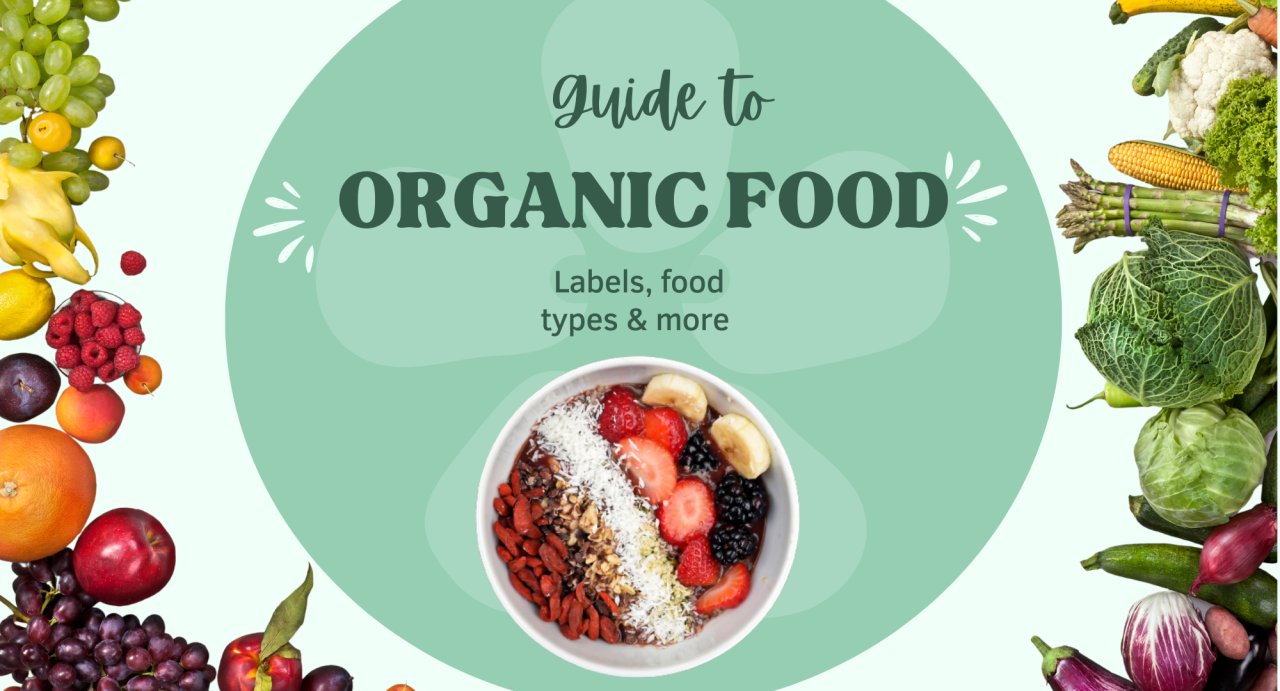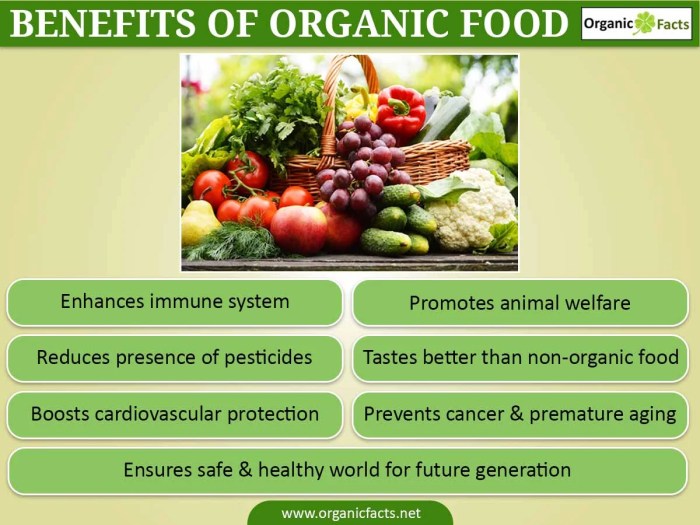Organic food benefits are all the rage, offering a mix of health, sustainability, and flavor that’s hard to resist. From the farm to your plate, dive into the world of organic goodness with us.
Organic food is more than just a trend – it’s a lifestyle choice that impacts your well-being and the planet. Get ready to discover the juicy details behind organic food benefits.
Introduction to Organic Food
Organic food is food that is produced using organic farming practices, which focus on utilizing natural methods and avoiding synthetic chemicals and pesticides. This results in food that is free from harmful chemicals and pesticides that are commonly found in conventional food products.
Examples of Common Organic Foods
- Organic fruits and vegetables
- Organic dairy products
- Organic meats and poultry
- Organic grains and legumes
Importance of Organic Farming Practices
Organic farming practices are essential for producing organic food because they promote environmental sustainability, protect biodiversity, and support animal welfare. By avoiding the use of synthetic chemicals and pesticides, organic farming helps to maintain soil health and reduce pollution. Additionally, organic farming methods often result in higher nutrient content in organic food products compared to conventional food.
Health Benefits of Organic Food

Organic food offers a myriad of health benefits that can positively impact overall well-being and disease prevention.
Nutritional Content
When comparing organic food to non-organic food, studies have shown that organic options tend to have higher levels of certain nutrients. For example, organic fruits and vegetables have been found to contain higher levels of vitamin C, antioxidants, and beneficial minerals like iron and magnesium. This increased nutritional content can help support a healthy immune system and overall bodily function.
Reduced Exposure to Pesticides
One of the key health benefits of organic food is the reduced exposure to pesticides. Organic farming practices prohibit the use of synthetic pesticides, which have been linked to various health issues, including cancer, hormone disruption, and neurological disorders. By choosing organic options, individuals can lower their risk of pesticide-related health problems.
Antibiotic-Free
Organic animal products, such as meat, eggs, and dairy, are produced without the use of antibiotics. This is important as the overuse of antibiotics in conventional farming has contributed to the rise of antibiotic-resistant bacteria, posing a serious threat to public health. By consuming organic animal products, individuals can avoid ingesting antibiotics and support sustainable farming practices.
Environmental Benefits of Organic Food: Organic Food Benefits
Organic farming practices have a positive impact on the environment by promoting biodiversity, soil health, and reducing chemical pollution and greenhouse gas emissions.
Promotion of Biodiversity
Organic farming methods prioritize the use of natural fertilizers and pest control methods, which helps maintain a balanced ecosystem. This approach allows for the coexistence of various plant and animal species, supporting biodiversity in agricultural landscapes.
Improvement of Soil Health
Organic farming focuses on building healthy soil through the use of compost, cover crops, and crop rotation. These practices enhance soil structure, increase water retention, and promote nutrient cycling. As a result, organic farms contribute to the overall health and sustainability of the soil.
Reduction in Chemical Pollution and Greenhouse Gas Emissions
By avoiding synthetic pesticides and fertilizers, organic farming helps reduce chemical pollution in the environment. Additionally, organic agriculture relies on sustainable practices such as crop rotation and natural pest control, which contribute to lower greenhouse gas emissions compared to conventional farming methods. Overall, the adoption of organic farming practices plays a crucial role in mitigating the environmental impact of agriculture.
Economic and Social Benefits of Organic Food

Organic food production not only benefits our health and the environment but also has significant economic and social advantages. By supporting local economies and small-scale organic farmers, we can create a more sustainable food system that benefits communities and individuals alike.
Local Economic Impact, Organic food benefits
Organic food production stimulates local economies by creating jobs, supporting small businesses, and promoting economic diversity. When consumers choose organic products, they are investing in their local communities and helping to create a more resilient and sustainable food system.
Supporting Small-Scale Farmers
Small-scale organic farmers play a crucial role in providing fresh, healthy food to local communities. By supporting these farmers, we can ensure a more equitable distribution of resources and promote agricultural practices that prioritize sustainability and environmental stewardship.
Social Implications
Consuming organic food has social implications that extend beyond individual health benefits. By choosing organic products, consumers can support ethical farming practices, reduce their carbon footprint, and promote social justice within the food system. Organic food can also help foster a sense of community and connection to the land, promoting a more holistic approach to food production and consumption.